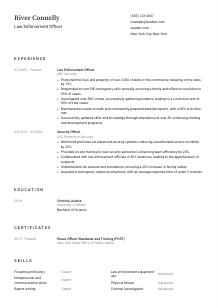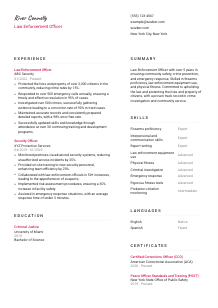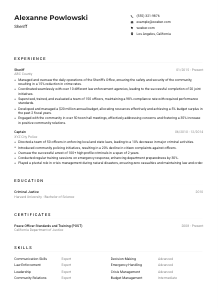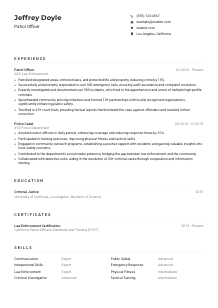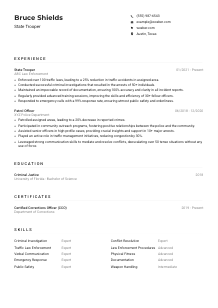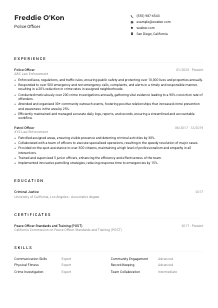Law Enforcement Officer Resume Example
Upholding the law, but your resume doesn't carry as much weight? Navigate this Law Enforcement Officer resume example, formulated with Wozber free resume builder. Learn how to showcase your commitment and experience to align with the jurisdiction of job requirements, paving the way for your career to serve justice at its prime!
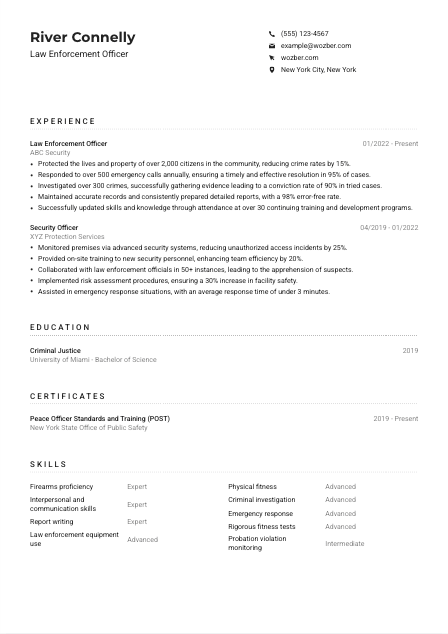
How to write a Law Enforcement Officer Resume?
Hello, aspiring Law Enforcement Officer! In the realm of public safety, your resume isn't just a piece of paper – it's a testament of your readiness to protect and serve. By leaning on Wozber's free resume builder, this guide will walk you through tailoring your resume specifically for a Law Enforcement Officer role, integrating crucial elements such as ATS optimization, using an ATS-friendly resume template, and embodying the essence of the profession.
Ready to start? Let's forge a resume that not only ticks every box but also tells your unique story in law enforcement.
Personal Details
In the world of law enforcement, making a strong first impression starts with your personal details. This section is akin to your professional badge, clearly and confidently stating who you are. Let's navigate through making your introduction impactful, fulfilling both the job's and the ATS's requirements.
1. Emphasize Your Name and Title
Your name is the beacon on your resume; ensure it's visible and authoritative. Positioning the job title 'Law Enforcement Officer' right beneath your name aligns you with the role from the get-go. It's a quick win in showing relevance.
2. Apply a Job-Specific Lens
"Law Enforcement Officer" is a badge of honor. Position it prominently, showing immediate relevance. It sends a signal that you're not just looking for any job – you're committed to serving as a law enforcement professional.
3. Optimize Contact Details
Ensure your contact information is clear and accessible. A professional email address (e.g., firstname.lastname@domain.com) and a phone number where you're readily available are key. Accuracy here is crucial; double-check for typos.
4. Confirm Your Locale
"Must be located in New York City, New York." Clearly stating your location as New York City directly aligns with the job requirement, eliminating any doubts about relocation or availability right from the start.
5. Digital Presence
If you have a LinkedIn profile that showcases endorsements or a personal website detailing your professional journey, include it. Make sure it's a mirror reflection of your resume for consistency.
Takeaway
Remember, your Personal Details section is the firm handshake before the real conversation begins. It's about setting a professional and relevant tone right from the kickoff. Adjust it meticulously to the job you're targeting, and you'll be ready to capture the hiring manager's attention.





Experience
In law enforcement, every experience you've embarked on shapes you. Your resume's Experience section is your patrol log, documenting your growth, success, and dedication to keeping the community safe. Let's make sure it speaks volumes about your qualifications for the position, aligning directly with what recruiters are seeking.
- Protected the lives and property of over 2,000 citizens in the community, reducing crime rates by 15%.
- Responded to over 500 emergency calls annually, ensuring a timely and effective resolution in 95% of cases.
- Investigated over 300 crimes, successfully gathering evidence leading to a conviction rate of 90% in tried cases.
- Maintained accurate records and consistently prepared detailed reports, with a 98% error‑free rate.
- Successfully updated skills and knowledge through attendance at over 30 continuing training and development programs.
- Monitored premises via advanced security systems, reducing unauthorized access incidents by 25%.
- Provided on‑site training to new security personnel, enhancing team efficiency by 20%.
- Collaborated with law enforcement officials in 50+ instances, leading to the apprehension of suspects.
- Implemented risk assessment procedures, ensuring a 30% increase in facility safety.
- Assisted in emergency response situations, with an average response time of under 3 minutes.
1. Dissect the Job Ad
Begin by breaking down the 'RESPONSIBILITIES' in the job description. For example, 'Responding to emergency calls' or 'Investigating crimes' should be directly mirrored in your resume with actionable achievements.
2. Chronological Layout
Document your roles in reverse chronological order, spotlighting your current or most recent position first. This layout is favored by hiring managers for its clarity and ease of understanding your career trajectory.
3. Detail Your Achievements
Replace generic job duties with achievement-focused statements. Quantify your impact whenever possible, like 'Reduced crime rates by 15%' or 'Responded to over 500 emergency calls annually,' directly tying your work to positive outcomes.
4. The Power of Numbers
Quantifying your contributions provides clarity on your impact. For instance, stating 'Investigated over 300 crimes, leading to a 90% conviction rate' showcases your effectiveness and dedication.
5. Align with the Role
Keep your sights set on relevance. If a past accomplishment mirrors a requirement or responsibility of the Law Enforcement Officer position, it deserves a spot in your resume. Ensure each bullet point helps build your case as the ideal candidate.
Takeaway
Your Experience section is the cornerstone of your professional narrative. It should echo your dedication to law enforcement, showcasing not just where you've been, but how those experiences have prepared you for this next step. Tailor it. Quantify it. Own it. You're not just applying; you're answering a calling.
Education
In law enforcement, your educational background is the foundation of your knowledge and skills. It's essential to tailor this section to reflect the prerequisites of your chosen field, showcasing your commitment to both formal education and ongoing training.
1. Match Educational Requirements
While the job description did not specify a degree requirement, having a relevant degree like 'Bachelor of Science in Criminal Justice' positions you as a more informed and prepared candidate.
2. Simplicity and Clarity
List your degree, the institution's name, and your graduation year. This straightforward presentation allows hiring managers to quickly ascertain your educational qualifications.
3. Degree Relevance
If the position specifically requires a certain educational background or field of study, ensure it's prominently listed. In cases where this isn't specified, your related degree could still set you apart.
4. Highlighting Courses
While not necessary for every role, mentioning specialized courses or training relevant to law enforcement can distinguish you, especially early in your career or for specialized positions.
5. Extra Achievements
Did you graduate with honors, or were you part of a relevant club or organization? These details, while not critical for seasoned professionals, can add depth for newer entrants to the field.
Takeaway
Your Education section is more than a list of schools and degrees; it's a testament to your preparedness and commitment to your career. While not the sole determinant of your hireability, it reinforces your appropriateness for the role – especially when aligned with the job's expectations and requirements.
Certificates
In law enforcement, certifications can significantly bolster your qualifications, serving as tangible proof of your skills and commitment to continuous learning. Let's navigate through showcasing your certifications on your resume, focusing on those most relevant to the role.
1. Certificate Relevance
Cross-check your certifications against the job requirements. Highlighting your 'Peace Officer Standards and Training (POST) certification' directly answers a critical job requirement.
2. Prioritize Impact
While it might be tempting to list every certificate you have, prioritize those that are most relevant to the Law Enforcement Officer role. This focused approach ensures your resume is tailored and impactful.
3. Timeliness and Transparency
Indicate the acquisition dates of your certificates, especially if they're recent. This demonstrates your dedication to staying current in a rapidly evolving field.
4. Stay Proactive
The field of law enforcement is constantly evolving, demanding continuous skill upgrading and learning. Regularly seek out training and certification opportunities that align with your career goals and the latest industry standards.
Takeaway
Your certificates are badges of your ongoing commitment to excellence in law enforcement. By strategically selecting and presenting your certifications, you underscore your preparedness and distinguish yourself as a top candidate. Let them reflect your dedication to upholding standards, improving your skills, and serving the community.
Skills
As a Law Enforcement Officer, your skill set is a unique blend of physical readiness, legal knowledge, and interpersonal prowess. This section allows you to concisely present the professional tools you wield to protect and serve. Let's create a skills inventory that aligns perfectly with the position's requirements.
1. Unpacking the Role
Start by mapping out both the explicit and implicit skills mentioned in the job description. Skills such as 'Firearms proficiency' and 'Emergency response' are direct matches for the role's requirements.
2. Skill Alignment
Focus on listing skills that directly respond to the job description. For a Law Enforcement Officer, including 'Interpersonal and communication skills' highlights your ability to de-escalate tense situations – a key aspect of the role.
3. Organization is Key
Resist listing every skill you possess. A concise, targeted skill set is more appealing to hiring managers. By prioritizing skills that are most relevant to the role, you ensure your resume speaks directly to the job's needs.
Takeaway
Each skill you list is a testament to your readiness and fit for the Law Enforcement Officer role. View your skills section as an arsenal – every item within it should serve a purpose and be ready to be deployed. Use this section to showcase your preparedness to serve, protect, and uphold the law.
Languages
In a city as diverse as New York, the ability to communicate in multiple languages can be a significant asset for a Law Enforcement Officer. This section allows you to showcase your linguistic prowess and its relevance to serving a multicultural community.
1. Language Requirements
Identify if the job posting explicitly requires language skills. For our example, emphasizing 'Native English' proficiency matches the job description's requirement, providing clear evidence of your capability to meet this need.
2. Essential Languages
If the job specifies a language requirement, prioritize listing it. For instance, stating that English is your native language and adding 'Fluent in Spanish' positions you as a versatile communicator in New York's diverse environment.
3. Showcasing Multilingual Skills
Even if additional languages are not specified in the job description, being fluent in other languages, such as Spanish, can be a strong asset, reflecting your ability to engage with various community members more effectively.
4. Honest Proficiency Levels
Be accurate in representing your language abilities. Misrepresentation can lead to awkward situations or unmet expectations. Clearly state your proficiency levels, such as 'Native' or 'Fluent,' to set clear expectations.
5. Understanding Role Scope
Consider the geographical and socio-cultural context of the role. For instance, New York City's diversity might often require engaging with non-English speakers, making additional language skills particularly valuable.
Takeaway
Your ability to communicate in multiple languages is not merely a skill – it's a bridge to connect with the community you're serving. Highlighting your linguistic capabilities can significantly bolster your application, showcasing your readiness to serve an increasingly global and diverse populace.
Summary
The Summary section of your resume is your opportunity to encapsulate your law enforcement journey in a powerful, concise narrative. It previews your professional story, aligning your experiences, skills, and personal traits with the position you're aspiring for. Let's craft a summary that compels the hiring manager to delve deeper into your resume.
1. Role Comprehension
A thorough understanding of the Law Enforcement Officer role, derived from the job description, sets the stage. Highlight your readiness and eagerness to serve the community, referencing specific skills and experiences that match the job's requirements.
2. Opening Pitch
Begin with an impactful statement that positions you as a dedicated professional. For example, 'Dedicated Law Enforcement Officer with over 5 years of experience in ensuring community safety, crime prevention, and emergency response.'
3. Tailoring Your Experience
Enumerate key skills and career highlights that directly address the job requirements. Mention your 'Firearms proficiency,' experience in 'Investigating over 300 crimes,' and 'Maintaining accurate records,' solidifying your fit for the role.
4. Brevity and Impact
Your summary should be a tight, compelling overview. In 3-5 lines, present yourself as the ideal candidate, focusing on how your background contributes to your ability to excel as a Law Enforcement Officer.
Takeaway
Think of your summary as the flag you're flying; it should proudly and succinctly display your professional identity and readiness for the role. Use it to grab attention, making it impossible for the hiring manager to pass over. It's your professional essence, distilled into a few powerful lines.
Embarking on Your Law Enforcement Journey
Congratulations on meticulously tailoring your resume for a Law Enforcement Officer role! By harnessing the power of Wozber's free resume builder, including both the ATS-friendly resume template and ATS optimization tools, you've taken a significant step toward landing your dream position. Your resume is now a beacon of your dedication, skills, and readiness to serve and protect. As you march forth, remember that your journey is both noble and necessary.
The community awaits your vigilance, empathy, and dedication. Keep striving, keep learning, and most importantly, keep serving with honor.

- Minimum of 2 years of active law enforcement experience.
- Graduation from an accredited Police Academy and possession of a valid Peace Officer Standards and Training (POST) certification.
- Proficiency in the use of firearms and other law enforcement equipment.
- Strong interpersonal and communication skills with the ability to effectively de-escalate tense situations.
- Physical fitness and ability to pass a rigorous fitness test as part of the application process.
- Proficient English language skills required.
- Must be located in New York City, New York.
- Protect the lives and property of citizens within the community.
- Respond to emergency calls, suspicious activities, and enforce traffic regulations.
- Investigate crimes, gather evidence, interview witnesses, and make arrests.
- Maintain records, prepare detailed reports, and testify in court.
- Continuously update skills and knowledge through regular training and development programs.





